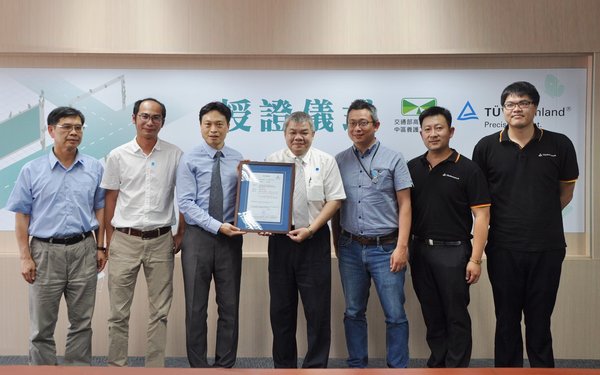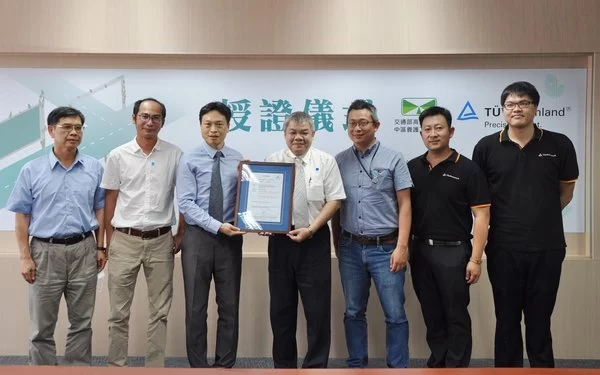TAIPEI, May 15, 2020 /PRNewswire/ — Whenever there is a surge in weekend or holiday traffic, it means heavy demand for parking at highway rest areas. People can often be seen circling endlessly in the parking lots for a parking space, wasting time and money. Sometimes, individuals will stop to rest at a service area but then forget where they have parked their car. The Central Region Branch Office of the Freeway Bureau, Ministry of Transportation and Communications (hereafter referred to as “CRBO”) has taken the lead in installing an e-parking system to help people with their parking needs. The system will alleviate parking stress at rest areas during public holidays and improve the turnover rate for service area parking.

Certificate handover by CRBO Director Huan-Ju Peng (right 4) and Kevin Wu (left 3), Vice General Manager of Mobility Service, TUV Rheinland
The smart parking directions system at the Nantou Service Area was certified after 1.5 months of system verification and testing. TUV Rheinland conducted 42 actual vehicle testing and verification tasks covering license plate recognition for streams of traffic, eTag detection, parking capacity monitoring, software and hardware functionality, and vehicle search functions. The system was validated against the project specifications and a certificate of conformity was subsequently issued on May 14. At the certification ceremony the two parties were represented by CRBO Director Huan-Ju Peng and Kevin Wu, Vice General Manager of Mobility Service, TUV Rheinland.
The purpose of the e-parking system is to help drivers find open parking spaces and to find their cars at rest areas more quickly. What distinguishes the e-parking system at the Nantou Service Area from traditional service areas is its ability to not only monitor traffic volumes but also to dynamically divert and balance traffic based on parking capacity. Vehicles can be directed to suitable sectors so they don’t all crowd near the retail area, stop in non-parking areas, or cause traffic jams at intersections while drivers try to find parking.
An outdoor e-parking system is more challenging to design than indoor systems (e.g., the parking lots at department stores or high-rises). Outdoor e-parking must take into account weather, environment, signal transmission, and whether monitoring may be affected by the glare from license plates. The introduction of e-parking at the Nantou Service Area will not only maximize the benefits of eTag but also set a precedent for outdoor e-parking in Taiwan.
The Central Region Branch Office, Freeway Bureau has transformed the Nantou service area into a large outdoor smart parking guidance field on the highway. To ensure that the e-parking system will continue to function correctly once it is formally launched, an international third-party certification body was introduced by the CRBO to verify the system before it is commissioned. The independent verification and validation (IV&V) plan developed by TUV Rheinland helped to ensure that the system will be more suitable for real-world conditions. The system integrates parking directions and management, traffic statistics, and vehicle search functions to get drivers from entrance to exit quicker and safer. If they happen to forget where they have parked their vehicle, they can simply enter their license plate at the traffic condition kiosk in the service area and it will display the vehicle’s location.
Local cultural motifs such as purple crow butterflies and owls have also been incorporated into the design of the Nantou Service Area. The CRBO will continue to monitor and refine the e-parking system’s functionality, safety, and accuracy in order to improve traffic flow and user satisfaction within the service area.
Photo – https://photos.prnasia.com/prnh/20200515/2805203-1?lang=0
Source: TUV Rheinland Taiwan Ltd.






